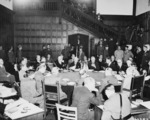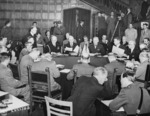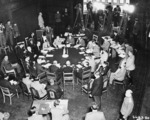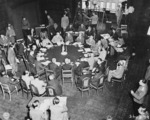Clement Attlee
| Surname | Attlee |
| Given Name | Clement |
| Born | 3 Jan 1883 |
| Died | 8 Oct 1967 |
| Country | United Kingdom |
| Category | Government |
| Gender | Male |
Contributor: Alan Chanter
ww2dbaseClement Attlee was born in Putney, London, England, Britain and educated at Haileybury and University College, Oxford. Whilst doing voluntary work at a boy's club in Stepney Attlee he became converted to socialism, and in 1913 became a tutor at the London School of Economics. During the 1914-18 War Attlee served in Gallipoli and Mesopotamia, where he was wounded. After recovery he served on the Western Front until the armistice, rising to the rank of Major.
ww2dbaseElected a Labour MP for Limehouse in 1922 he became Ramsay MacDonald's Parliamentary Secretary (1922-24), and from 1924, Under Secretary of State for War. He led the Labour opposition (in which he is best remembered for his support of the British volunteers fighting in the Spanish Civil war) from 1935 to 1940, before joining Churchill's Wartime coalition cabinet. He became deputy Prime Minister in 1942, a post he held until 1945.
ww2dbaseDuring the War it was largely due to Attlee and Ernest Bevin's efforts that virtually the whole British nation was mobilzed for war. Attlee would work as a restraining influence on some of Churchill's more wilder schemes.
ww2dbaseHe became Prime Minister in 1945, where one of his first tasks was to take over from Churchill at the Potsdam Conference. During his six years in office he would carry through a vigorous programme of reforms. The Bank of England, the coal mines, civil aviation, cable and wireless services, gas, electricity, railways, road transport and steel were nationalized. The National Health Service was introduced and independence was granted to India (1947) and Burma.
ww2dbaseThe major problem during his term as Prime Minister was the British Economy. The cost of the War had virtually bankrupted the country, which now needed to find he funds for rebuilding and restructuring to the peacetime situation. The Americans, however immediately demanded payment of Britain's Wartime debts-a situation that placed all future plans in jeopardy. Eventually negotiations with the Americans provided a new loan (although not as much as was required) for Britain's immediate requirements.
ww2dbaseThe Labour party was defeated in 1951 and Attlee spent the next four years again as leader of the opposition until resigning in 1955. He was granted a peerage and was active in the House of Lords until his death in 1967.
ww2dbaseSources: A History of Modern Britain (Andrew Marr, Macmillan Publishing, 2007), the World at War (Mark Arnold=Forster,Fontana/Collins, 1973).
Last Major Revision: Sep 2007
Clement Attlee Interactive Map
Photographs
 |  |  |  |
Clement Attlee Timeline
| 3 Jan 1883 | Clement Attlee was born. |
| 19 Feb 1942 | Major changes were made to the British War Cabinet. Sir Stafford Cripps became Lord Privy Seal and Leader of the House of Commons. Mr. Clement Atlee became Secretary for the Dominions and Mr. Oliver Lyttleton was appointed Minister of State with special responsibilities for all branches of production. Outgoing Ministers of the Cabinet were Lord Beaverbrook, Sir Kingsley Wood and Mr. Arthur Greenwood. |
| 26 Jul 1945 | Clement Attlee became the Prime Minister of the United Kingdom. |
| 8 Sep 1946 | About a thousand people converged on Kensington High Street in London, England, United Kingdom intent on taking over empty properties for desperately needed accommodation. In a typically British response the Women's Voluntary Service provided hot drinks to the demonstrators while even the police supplied tea and coffee from Kensington Barracks. The Press were sympathetic too as were much of the public, some of whom actively assisted the squatters by passing food and drink through windows. The police picked up and distributed food parcels and blankets, money, food, chocolate and cigarettes were collected for the families. Student from London University marched throughout the streets in support. After Prime Minister Clement Attlee refused to meet with a delegation a frightened government threaten to employ force to evict the squatters, but the protest eventually ended when it was announced that squatters could lose their rights to a place on the Council Housing queue if they persisted in occupation. |
| 8 Oct 1967 | Clement Attlee passed away. |
Did you enjoy this article or find this article helpful? If so, please consider supporting us on Patreon. Even $1 per month will go a long way! Thank you. Share this article with your friends: Stay updated with WW2DB: |
» Potsdam Conference
Document(s):
» No. 11: Question and the Prime Minister's answer in the House of Commons
Related Books:
» Countdown 1945
» Ministers at War: Winston Churchill and His War Cabinet
- » 1,150 biographies
- » 337 events
- » 43,917 timeline entries
- » 1,241 ships
- » 350 aircraft models
- » 207 vehicle models
- » 374 weapon models
- » 123 historical documents
- » 260 facilities
- » 470 book reviews
- » 28,541 photos
- » 432 maps
Captain Henry P. Jim Crowe, Guadalcanal, 13 Jan 1943
Please consider supporting us on Patreon. Even $1 a month will go a long way. Thank you!
Or, please support us by purchasing some WW2DB merchandise at TeeSpring, Thank you!